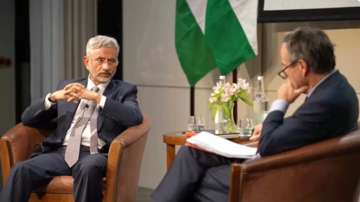External Affairs Minister S Jaishankar on Wednesday said that India is not ruling out an investigation but asked Canada to substantiate its allegations of India's involvement in the killing of Khalistani terrorist Hardeep Singh Nijjar. His comments came in response to a question posed by journalist Lionel Barber, during a conversation hosted by the High Commission of India in London, titled "How a billion people see the world."
Emphasising the significance of credible evidence, Jaishankar categorically stated that there was no involvement of the Indian government in the killing of Nijjar. In response to Canadian Prime Minister Justin Trudeau's allegations, the Indian External Affairs Minister stated that he discussed the matter with his Canadian counterpart, Melanie Joly, and urged the Canadian government to provide any substantial evidence. He emphasised that while India is eager to look into the matter, no proof has been presented as of yet.
"Now, in the case of Mr Trudeau, I have discussed it also with my own counterpart. And we have told them, look, if you have a reason to make such an allegation, please share the evidence with us. We are not ruling out an investigation and looking at anything which they may have to offer. They haven't done so," Jaishankar said.
What Jaishankar said on Canadian political views?
During the discussion, Jaishankar addressed the broader issue of violent and extremist political views in Canadian politics advocating separatism from India, some through violent means. "In Canada, we feel that Canadian politics has given space to violent and extreme political opinions which advocate separatism from India, including through violent means. And these people have been accommodated in Canadian politics," the EAM said.
Jaishankar also pointed out that such viewpoints have been accommodated in Canadian politics, which has resulted in intimidation of consul generals and other diplomats as well as attacks on Indian diplomats, including the High Commission. "We have had attacks on the High Commission, smoke bombs thrown at the High Commission. My Consul general and other diplomats were intimidated in public, on record, with no action taken by those who did know. This is a country where there is a previous history," he added.
Amid a diplomatic row between India and Canada over the killing of Khalistani terrorist Hardeep Singh Nijjar, Indian High Commissioner to the UK, Vikram Doraiswami, was stopped by a few radicals from entering a gurdwara in Glasgow in October this year.
Jaishankar also emphasised the need for responsibility in exercising freedom of speech and expression in Canada. He stated, "But freedom of speech and freedom of expression also comes with a certain responsibility. And the misuse of those freedoms and the toleration of that misuse for political purposes would be, to our mind, very wrong."
Earlier this month, Trudeau reaffirmed his allegation of Indian involvement in the killing of Sikh terrorist Nijjar on his home soil, accusing New Delhi of violating the Vienna Convention by "kicking out" 40 diplomats at a time when his country had reached out to the former and other global partners to get to the bottom of the murder.
India-Canada relations
India established diplomatic relations with Canada in 1947. India and Canada have longstanding bilateral relationship based on shared democratic values, the multi-cultural, multi-ethnic and multireligious nature of two societies and strong people-to-people contacts. While the two nations have a broad-based relationship, their ties have often been strained by Sikh separatists involved with the Khalistan Movement, calling for an independent Sikh state in India. More recently, diplomatic tensions were triggered in September 2023, following Canadian Prime Minister Justin Trudeau's allegations that Indian agents were involved in the killing of a Sikh separatist leader.
(With inputs from ANI)
ALSO READ: Amid diplomatic row, another disturbing video of Khalistani brawling with Hindus on Diwali in Canada emerges
Latest World News
